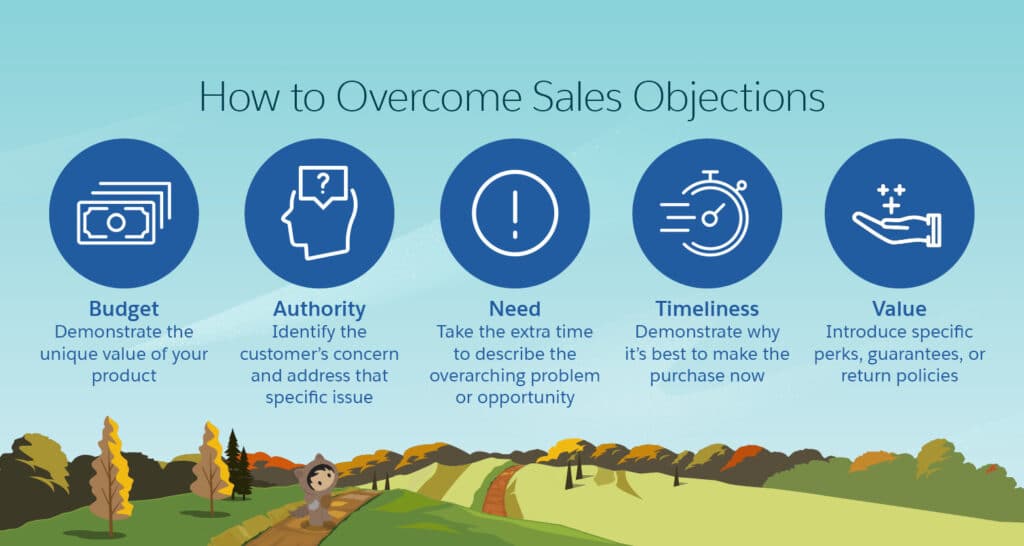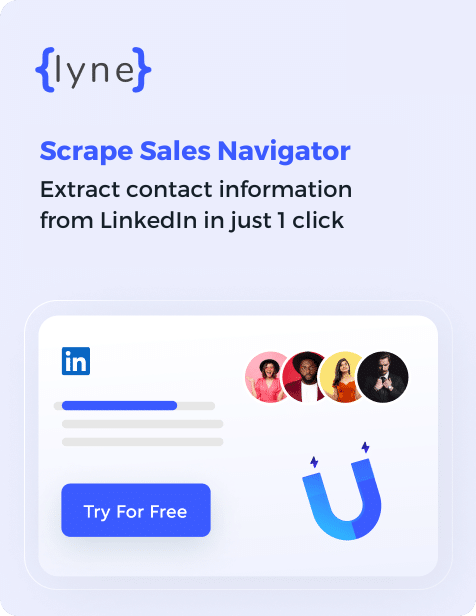Are you finding it hard to find rebuttals for common sales objections? Keep reading to find the best rebuttals for the 8 most common sales objections.
Many sales reps find themselves in the difficult position of having to deal with objections on sales calls. While it can feel demorsalizing in the moment, it’s important to remember that rejection is simply a part of the sales process. However, any sales professional can turn an objection into an opportunity with the right attitude and a little preparation.
Contents
What are Sales Objections?
Sales objections are the reasons that buyers give for not wanting to buy a product or service. They can be anything from concerns about the price to doubts about the product’s quality or suitability for their needs.
Objections aren’t exclusive to any particular part of the sales cycle either. You could be met with an objection during any of the following stages of the sales process:
Lead Generation: Cold calling campaigns to generate new leads
Lead Nurturing: The process of qualifying and scoring warm leads
Deal-Closing: Guiding the prospect towards a sale
Post-Sale: Attempts to bring the prospect back through the sales funnel after a purchase
While some objections are warranted, others may just be bad timing or based on misunderstandings about your product or service. In either case, a well-crafted rebuttal can help you maintain control of the conversation – ensuring that you don’t miss any opportunities to re-engage your prospect.
To help you prepare for future sales objections, we’ve compiled a list of the most common ones you’re likely to encounter, along with the best rebuttals to overcome them.
8 Common Sales Objections and the Best Rebuttals to Use

Objection: “I’m not interested.”
Salespeople across every industry have become accustomed to hearing this common sales objection. You may have even used this yourself when getting spammy sales calls for student debt relief or extended warranties on cars that you don’t even own.
This first objection is often an impulsive reaction to a sales pitch. It typically has anything to do with you, so don’t take it personally.
Rebuttals:
The best way to deal with this type of objection is not to contradict your prospect. Instead, empathize with how they feel, share an example of someone who felt the same way they do, and then offer them a solution.
Response option #1
“I understand, (name). My client XYZ felt the same way when I first gave them a call, and now they’re using our solution to improve X within their business. If you’re too busy right now, would tomorrow at X or Y time be a better time to reconnect?”
Response option #2
“(name), I completely understand why you wouldn’t be interested; you sound like you’re quite busy today. My client X from (business name) was buried in work as well when I first reached out to them, but today they’ve seen a huge improvement in their productivity since using our product. What is your availability this week so we can continue this conversation at a time that’s better for you?”
Objection: “We’re already working with your competitor.”
This objection is common, especially when selling a service, product, or enterprise software in a competitive market. The critical thing to note is that there is still an opportunity for you here. They’ve already invested in a similar solution which means they do have a need for the type of product or service you’re offering.
Although overcoming this objection is challenging, it isn’t impossible. They may be using a competing product, but they haven’t revealed whether or not they’re happy with their current provider.
Rebuttals:
In this case, you’ll want to identify the competitor and any existing pain points in their current solution. Ask questions that will enable you to share some of the highlights of your products while getting them to consider whether or not their existing solution was the correct choice. It helps to be an expert in your competitors’ products as well as your own.
Response option #1
“That’s great to hear! Many of our happy customers were using that solution in the past as well. In your experience, has (competitor’s) lack of (list 2 features) made it challenging to perform (task) and achieve your desired results?”
Response options #2
“That’s great – they’re definitely a top-rated company in this space. Many of our customers were using them as well before they switched to our product for the added benefits of (unique feature 1) and (unique feature 2).”
Objection: “It’s too expensive” / “Your price is too high.”
This objection is to be expected when you’re selling a high-ticket item or service. The prospect may feel like they’re overpaying for something if they don’t fully understand its value to their time and business. It’s important to remember that the price objection is usually a negotiating tactic or a failure to fully grasp your solution’s benefits. It’s not often a reflection of someone’s actual ability to pay for your product or service.
Rebuttals:
The best way to respond is to focus on the value that they’ll be getting in return for the price they’re paying. While money is important, it isn’t everything, so be sure to highlight any time savings or growth opportunities that they’ll gain from using your product or service.
Response option #1
“I understand where you’re coming from, (name). Ultimately, it really comes down to how you value your time. For example, how much time do you lose each week doing X, Y, and Z tasks? How could you better use that time if our solution reduced those hours to a few short minutes? Could you increase your sales, achieve faster growth, or even improve your work-life balance? I’d love to show you how!”
Response option #2
“I’m glad you mentioned that, (name). If you feel that way, I probably should have done a better job of explaining our solution’s incredible benefits. What if I could show you how our product will save you X hours per week, with the help of Y feature? What if it helped eliminate the pain points in (task) and (task)? Would that make a difference?”
Objection: “Can you just send me the information in an email?”
Prospects will resort to this clever tactic when they’re trying to get you off the phone. At this point, they’ve likely already decided that they don’t have a use for your product, but they’re trying to spare your feelings.
Rebuttals:
Now that you’ve read this helpful guide, you’ll be able to see right through this kind of objection. By sending them some sales whitepapers of your products, there’s a good chance your email will end up right in their inbox trash bin. Before sending any information their way, try to further qualify them as a prospect by getting them talking with some open-ended questions.
Response option #1
“Sure, I’d love to send you some information. However, since I don’t want to waste your time by sending you information that you don’t need, could I ask you a few quick questions? I want to make sure you’ll only get information that interests you and is relevant to your business.”
Response option #2
“No problem, (name). I’ve got some great documents that I’d be happy to send your way. Before I do, I want to make sure you only receive information that is relevant and helpful to your business. Are there any specific things that you look for when evaluating a new solution like ours?”
Objection: “Is this a sales call?”
This objection can quickly stop you in your tracks, but don’t let it catch you off guard. While this is technically a sales call, an expert salesperson like you shouldn’t make the call feel that way at all. Instead, shift your response by reassuring them that you’re only trying to learn more about their business and want to help them achieve their goals.
Rebuttals:
The best way to overcome this objection is to get the prospect talking about themselves and their business. You don’t want to come off as just another spammy sales pitch. Instead, focus on building a relationship with them rather than selling them something. Once you’ve established some rapport, you can start to incorporate your pitch into the conversation more organically.
Response option #1
“My intention isn’t to try and sell you anything today, (name). I want to learn more about your goals and to see what aspects of your business are preventing you from achieving success. Would you consider answering a few quick questions about your business goals?”
Response option #2
“I understand why you feel that way, but I assure you that I don’t know enough about you or your business to try and sell you anything today. Truthfully, I would actually love an opportunity to learn more about your goals and get a better understanding of the struggles and pain points you’re facing. Would you mind if we talked a little more about your business?”
Objection: “This isn’t a good time.”
This objection is common among busy professionals who don’t want to take time out of their day for a sales call. While they may be in the process of a reorganization or have maxed out their quarterly spend, odds are they’re just trying to get you off the phone.
Rebuttals:
To overcome this objection, you’ll need to be very understanding and show genuine interest in their business. Try scheduling a follow-up call or ask if there’s a better time for them to talk.
Response option #1
“I completely understand. I don’t want to take up too much of your time, so why don’t we schedule a more convenient time for you. When would be the best time this week?”
Response option #2
“No problem, (name). Is the bad timing due to a stressful business transition or something else? I’d be happy to put some time on my calendar on a day that’s more convenient for you.”
Objection: “I’m the wrong person to talk to about this.”
This objection typically comes from a prospect who doesn’t have the authority to sign off on a purchase. Don’t be afraid to use this as an opportunity to try and get in touch with a decision-maker in the business.
Rebuttals:
Your first instinct may be to apologize and thank them for their time. You may also consider asking them for the contact information of the appropriate person. In reality, the best rebuttal is to try and get them to introduce then transfer you directly to the decision-maker, increasing your chances of getting in touch with them.
Response option #1
“I completely understand, (name). Would you help me by giving me the name of the decision-maker in your organization? I’d appreciate it if you could transfer me to them.”
Response option #2
“I’m sorry for the inconvenience, (name). Would you be able to put me in touch with the decision-maker? I would love an introduction if you’d be able to facilitate that.”
Objection: “I need to get more quotes first.”
When you get this objection, your prospect could be brushing you off, or they could very well be shopping around with your competitors. If they are pricing out their options, it’s your job to find out what their top priorities are in the decision-making process.
Take the time to ask questions, and be sure to probe a little deeper. Find out their budget and see if you can work within those constraints. You may also want to ask them their timeline for making a decision. Additionally, you’ll want to determine whether they’re looking for the best price, customer service and support, unique features, ease of use, or another key factor.
Rebuttals:
It’s common for prospects to want to shop around and get more quotes before moving forward with a purchase. Your best bet is to provide as many compelling reasons as possible as to why your product or service would be preferable over your competitors.
Response option #1
“I completely understand, (name). If I were in your shoes, I’d probably feel the same way. Can we discuss what your top priorities are in the decision-making process? It will help me ensure that I’m providing you with the best value possible while making sure that our solution will be able to meet your needs.”
Response option #2
“I completely understand your hesitation to make a decision without considering all of your options. Would you mind sharing your top priorities when it comes to making this purchase? Is it the best price, the customer service, support, unique features, or something else? I want to make sure that the solution we’ve quoted meets your needs and aligns with your other options.”
Related Post:
7 Best Subject line for Reconnecting Email 2022
Intent Data: What It Is and How to Use It in Sales
What Is A Discovery Call: Why You Shouldn’t Skip This Step
Frequently Asked Questions (FAQs)
How do you handle rebuttals in sales?
To handle sales rebuttals, involve yourself in active listening. Give your prospect all the time to speak and internalise the problem. After understanding the problem, paraphrase the issue and confirm it to ensure you understand the objection correctly. Provide solutions whenever possible, and if not possible, simply acknowledge the objection.
How do you respond to sales objections?
To respond to the sales objections, listen carefully without interrupting. After listening to the objection, ask the required questions to understand the objections in detail. It will also buy you some time to think about whether you have a solution or not. If you can provide a solution, explain it to the prospect in detail to help them understand the value that the solution brings.
What are common sales objections?
The most common sales objections are lack of budget, lack of priority and lack of trust, especially if your company is a small business or a start-up. A prospect also often raises objections citing that they do not have a problem.
How do you respond to a no in sales?
A good salesperson should know that rejection is part and parcel of life. Respect the decision of the prospect and understand the reason behind their rejection. Acknowledge their point of view to make them feel valued, and finally, let go of the prospect calmly and without taking anything personally.
Why are rebuttals important in sales?
Rebuttals are necessary in sales to convert a “no” or “maybe” to a “yes. With rebuttals, you help the prospect to understand more about the value that the product or service brings to the table.
Rebuttals: the Conclusion
There you have it, the best rebuttals for the 8 most common sales objections. Keep these rebuttals in mind when you’re faced with any of these objections, and you’ll be able to overcome them with ease. Take some time to rework these rebuttals to suit your particular solution and industry. The more time you invest in crafting your rebuttals, the more effortless it will be to use them in your customer calls.

Source: Salesforce
Remember to focus on building a relationship with your prospect and always put their needs first. They’ll start to see you as a true partner rather than just another salesperson. It’s a common misconception that sales is all about pitching and closing, but the best sales reps know that it’s really just one major relationship-building exercise.
If you’re looking for more sales inspiration, consider listening to some of these top sales podcasts from industry professionals that were once in your shoes.
Good luck out there, and happy selling!
Hey, I’m Hans, Co-Founder and CEO of Lyne.ai. I used to run hundreds of campaigns for clients when I ran my own cold email agency. Having to train and manage that many virtual assistants or SDRs can get very stressful, which is why we built Lyne. Now you can write thousands of personalized first lines for cold emails in less than an hour & all without being locked into a monthly plan.





